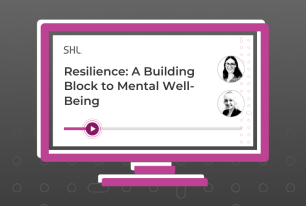Feeling Remote? Tips on Staying Productive from a Remote Work Veteran
5 productivity tips for remote work newbies from an old pro.
Share
About ten years ago my partner was offered a full scholarship to law school. We were living in Minneapolis at the time, but the law school was in Ohio. Though SHL has offices all over the world and multiple within the USA, we had no office in Ohio. We couldn’t let this opportunity pass us by, so we packed up and moved, and I became a full-time remote worker for the first time.
My job is already 100% computer-based, so there was no adjustment there, but removing myself from an office environment introduced many challenges that affected productivity. Over the years I learned several tricks to stay productive and sane. Here are my top five:
#1 - Separate
I am fortunate in that I have space in my home for a room entirely devoted to work. Not everyone will have this, but it is important to dedicate a space in your home, even if it is a corner of the kitchen or a specific cushion on the sofa, where only work occurs. Having a separate physical space dedicated to work makes it easier to form a mental separation between your work life and your home life. If you need to take care of something non-work related like paying a bill, taking a call from your sister, or checking out Instagram, leave your workspace to do it. This will also help you gain awareness of how much time you are spending on non-work activities.
Having a separate physical space dedicated to work makes it easier to form a mental separation between your work life and your home life.
#2 - Connect
When in an office a lot of informal information sharing and relationship-building happens at the proverbial water cooler. When this is no longer an option, you may find yourself spending too much time focusing on tasks and running out of steam. Take a look at whatever chat system you use and see which of your colleagues isn’t currently in a meeting. Say hi, see how they are doing, share ideas you have, ask questions about their projects, and share whatever personal tidbits you would normally share at the water cooler. Your coworkers are likely just as eager for social interaction. Virtual connections help break up your day, facilitate idea sharing, and relieve stress.
#3 - Disconnect
This may not be an issue for everyone, but when I first started working remotely, I ended up working up to two or three hours longer each day than my in-office coworkers because I didn’t know when to end my day. Working in an office, I had to catch the 41A bus at 5:15 pm, so it was easy to call it a day at 5 and head home. When I no longer had a commute, I would just continue working until my partner called me to the dinner table.
This upset our relationship and caused me to burn out on work. I was less and less eager to start each workday. I created a defined start and stop time each day. I blocked out my calendar beyond work hours and shut down chat when quitting time came.
I schedule a lunch where I leave my work area to walk my dogs and eat my meal. Resist the temptation to eat at your desk. Sometimes things happen and I must work beyond normal hours, but it is just as important for productivity to disconnect as it is to engage.
Starting your morning as if you were planning to head to the office is a great way to mentally prepare for your day.
#4 - Dress for Success
A lot of people might think it is silly to put on the khakis and button-down on when you’re sitting alone in your kitchen, but starting your morning as if you were planning to head to the office is a great way to mentally prepare for your day. Staying in your pajamas can make it difficult to fully engage.
#5 - Keep Moving
I’m not talking about your workout routine here. Even if you work out for three hours every morning, it is still important to get the blood flowing throughout the day. Working from home offers the opportunity to work from places considerably more comfortable than a standard desk and chair. If your only dedicated space is a comfy recliner, that’s fine, but its easier to drift off when a task is less than engaging. There are a multitude of fitness apps that remind you to stand, but I recommend standing to get some water and doing a few stretches when you notice you’re starting to lose focus.
Whether you’re an introvert like me or an extrovert, social interaction is important. We are facing something unprecedented, and it is important to share your concerns with and offer support to your colleagues. We will get through this together even if we are physically isolated from one another.









